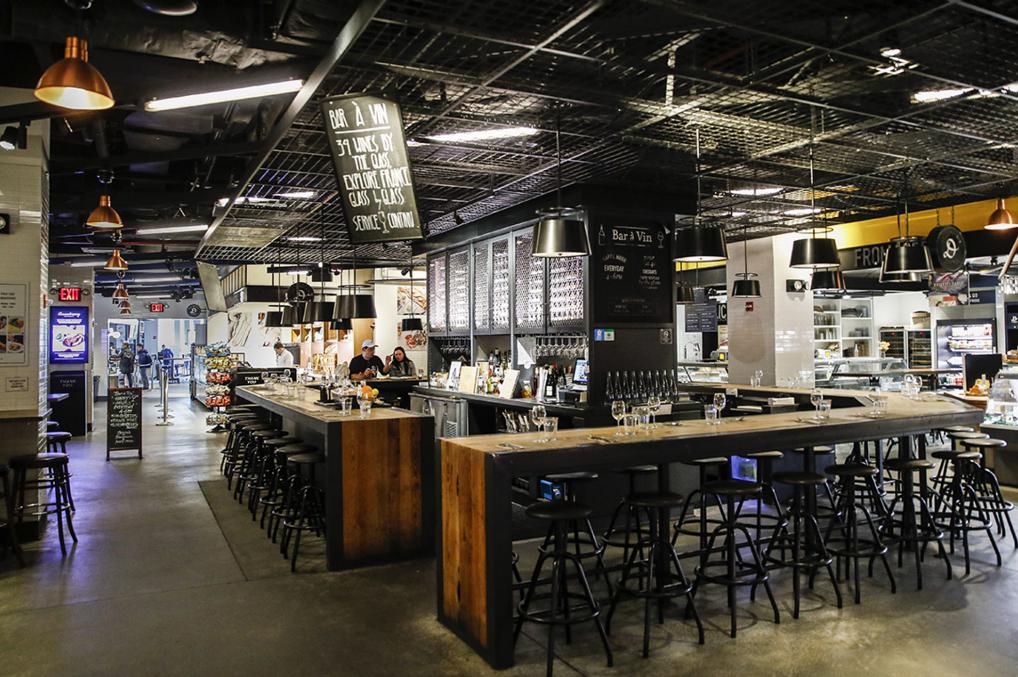
Few guests sit in a bar as a succession of states in the U.S. announced closures of restaurants, bars and other venues to mitigate the spread of the coronavirus. /AP
随着新冠肺炎疫情日趋严重,各国纷纷颁布居家隔离的措施。目前,全球有约超过30亿人开始了“自我隔离”,最近几周,许多人已经开始在家工作,学校已经取消了课程,体育赛事和宗教事务也被取消,许多国家的餐馆、零售店、健身房、酒吧、剧院和其他聚会场所都已关闭。
这些措施都是为了加强社会隔离,面对疫情,这是一项重要的公共卫生干预措施,可以有效阻止新冠病毒的传播。然而,心理健康专家警告说,减少日常与社会的联系可能会损害心理健康。而且社会隔离拖得越久,社会各方面为之付出的成本就越高。
纽约诺斯威尔健康中心的精神病学家Damir Huremovic告诉Science News的记者,令他担忧的是因为社会隔离所造成的焦虑感,将有可能成为长期困扰人们的因素之一。
他说,当这种隔离的状况持续几周以上后,人们的健康问题就会出现。新冠疫情对人们的潜在影响将是数月的社会隔离,经济衰退、社会动荡和失业,这些可能对人们引发不可预测的心理压力。
新冠疫情的肆虐在生理和心理上威胁着全人类。
3月14日,著名医学杂志《柳叶刀》发表了一份评估报告,披露了自21世纪初期以来,在非典(SARS)、甲型H1N1流感、埃博拉(Ebola)和其他传染性疾病爆发期间,被隔离人群的24项心理评估结果。
More than three billion people globally are living under lockdown measures. Many people in recent weeks have begun working from home, if they havent been furloughed or laid off. Schools have canceled classes. Sporting events and religious services have been called off. Restaurants, retail stores, gyms, bars, theaters and other gathering places have all been shuttered in many countries.
These closures are all attempts to enforce social distancing, an important public health intervention that can help stop the spread and transmission of the coronavirus. However, mental health experts are warning that losing everyday social connections can harm psychological health. And the costs could go up the longer the measures drag on.
Damir Huremovic, a psychiatrist of Northwell Health in New York, told ScienceNews reporters that what worries him is the potential for social distancing to become a long-term event.
He said health problems associated with social isolation tend to crop up when the situation goes on beyond a few weeks. Walling people off from one another for months means the secondary effects of the pandemic, such as recession, social unrest and unemployment, could trigger unpredictable and widespread mental health challenges.
The coronavirus pandemic threatens all of humanity both physically and psychologically.
On March 14, The Lancet, a prestigious medical magazine, published an evaluation of 24 studies looking at the psychological outcomes of people who were quarantined, an extreme form of social distancing, during outbreaks of SARS, H1N1 flu, Ebola and other infectious diseases since the early 2000s.
People at a bar before the UKs PM ordered all recreational facilities to shut their doors, Newcastle, Britain, March 20, 2020. /Reuters
评估报告发现,许多被隔离的人或多或少经历了短期或长期的精神健康的困扰,包括压力、失眠、情绪衰竭和药物滥用。导致这些心理问题的因素包括持续10天以上的隔离(这主要与创伤后应激有关),对于强制隔离的信息不透明化(与疫情相关的谣言满天飞),以及缺乏生活医疗必需品和通讯服务。
虽然大多数生活在疫情肆虐的国家的人们并没有被隔离,但其研究表明,即使不采取极端社交隔离,比如避免有规律的外出和连续几周待在家里,都会造成心理压力。
这种孤独总是与焦虑感联系在一起。2015年,美国犹他州杨百翰大学(Brigham Young University)的健康心理学家朱利安·霍尔特·伦斯塔德(Julianne Holt Lunstad)对70项研究进行综合分析,涉及340多万位参与者,平均随访7年。
霍尔特·伦斯塔德和她的同事们发现,在跟踪研究期间,感到孤独的人的死亡可能性增加了26%,被社会孤立的人的死亡可能性增加了29%,独自生活的人的死亡风险率增加了32%。
然而,并不是所有经历社会隔离的人都需要忍受心理疾病。相反,有些人在这段时间内,过得比其他人更好。疫情中,他们中的一些人因为与家人有更深的联结而显得更加紧密。有些人会通过电话、短信或加入在线社交应用来保持联系。
The review found out that many quarantined individuals experienced both short- and long-term mental health problems, including stress, insomnia, emotional exhaustion and substance abuse. And the factors increasing the risk of psychological problems include quarantines lasting longer than 10 days (which was associated mostly with post-traumatic stress), poor information about the rationale for the quarantine, and lack of access to necessary supplies and telecommunication services.
Though most people living in coronavirus-stricken countries arent quarantined, other researches suggest even less-extreme forms of social distancing, such as avoiding regular outings and staying at home for several consecutive weeks, might take a toll.
Such isolation is always linked with the feeling of loneliness. The coauthor of the review, Julianne Holt Lunstad, a health psychologist at Brigham Young University in Provo, Utah, in 2015 conducted a meta-analysis of 70 studies involving more than 3.4 million participants followed for an average of seven years.
Holt Lunstad and her colleagues found out that the likelihood of dying during the study period increased by 26 percent for those who reported feeling alone, 29 percent for those who were socially isolated and 32 percent for those living alone.
However, its not necessary for all people who are experiencing a period of social distancing to endure psychological illness. Some people, on the contrary, fare better than others during this period, as some of them actually see their social contact increase as families hunker down together. And some people will stay connected through phone calls, text message or joining an online community.
Women wear face masks as they walk on Clapham High Street in London, March 28, 2020. /Reuters
如何缓解疫情期间“社交隔离”产生的焦虑感呢?
专家们还提出了一些科学便捷的方法来缓解人们在隔离状态下的焦虑感。以下是他们的一些建议:
1. 运动
体育运动可以使身体产生一种叫做内啡肽的激素,这种激素可以帮助缓解焦虑,改善情绪。事实上,根据《Journal of Happiness Studies》2018年发表的一项研究,锻炼十分钟就能提升幸福感。在许多国家,人们在阳台上唱歌,这也是缓解愤怒和压力的一种好的方式。
2. 让自己忙起来
参加一些活动,也会让你的注意力不再关注在令人感到压力的时事新闻上。你可以看你最喜欢的电影和电视节目,培养一个新的爱好,比如烘焙或手工DIY,参加一个在线健身班,或注册一个免费的在线大学课程。此外,你还可以通过谷歌艺术与文化频道在线虚拟游览博物馆、国家公园和其他景点,收听音乐会和其他活动的现场直播。
3. 对自己焦躁不安的想法进行内省
恐惧来源于消极的想法和信念。所以,试着复盘你的想法,更好地管理你的情绪。例如,在醒来或睡觉前写下积极肯定的想法,这对重塑自己积极的思维很有帮助。
4. 腾出时间照顾自己
当负面情绪增加时,请每天给自己留点时间,即使你很累,也要做一些让自己感觉良好的事情。无论是写日记、读书、和你的宠物玩耍还是听音乐。此外,不要忘记提升自我,例如健康饮食、充足的睡眠和有规律的体育活动。
5. 与家人和朋友保持联系
维持社交联结可以感到生活一如既往地进行着,与家人朋友分享感受也为缓解压力提供了一个有价值的渠道。你不会因为打电话、发短信或在社交媒体上与家人和朋友聊天而感染新冠肺炎。
6. 为他人着想
帮助别人也是提高幸福感的一个好方法。在中国,一些人通过组织捐赠活动和志愿为被隔离者运送食物和其他必需品来寻找自我价值的认同。同样,在加拿大,也掀起了一股“关爱他人”的风潮——人们自愿为有需要的人跑腿、做家务。在西班牙,相关集体健身课程将为那些被隔离的居民开设,以便他们在自家阳台上锻炼。
Experts have also suggested scientific and handy measures to improve peoples mental and emotional well-being during isolation. Following are some of their tips:
Move around. Physical activity helps ease anxiety and improve your mood by producing stress-relieving hormones called endorphins. In fact, according to a 2018 study published in the Journal of Happiness Studies, exercising for as little as ten minutes can boost happiness. In many countries, people sing on their balconies, which is also a better way to relieve anger and stress.
Keep yourself busy. Engaging in activities that distract you from current events can also be helpful. You can watch your favorite movies and TV shows, pick up a new hobby like baking or DIY crafts, join an online fitness class or enroll in a free online university course. In addition, you can take virtual tours together of museums, national parks and other sites via Google Arts & Culture, tune in to live-streamed concerts and other events.
Check your thoughts. Fear feeds off of negative thoughts and beliefs. So try reframing your thoughts to manage your emotions better. For example, writing down positive affirmations when you wake up or before going to bed can be powerful in rewiring your mindset.
Make time for self-care. When stress heightens, please carve out some time for yourself every day, even when youre hunkered down, to do something that makes you feel good. Whether its journaling, reading a book, playing with your pet or listening to music. Also, dont forget the critical self-care activities like eating healthy, getting adequate sleep and regular physical activity.
Stay connected with family and friends. Maintaining social networks can foster a sense of normality and provide valuable outlets for sharing feelings and relieving stress. You wont get infected with COVID-19 by talking on the phone, texting or chatting with your family members and friends on social media platforms.
Be there for others. Helping others is also a good way to improve happiness. In China, some people find self-value by organizing donation activities and volunteering to deliver food and other necessities for the quarantined. Similarly, Canadians have kickstarted a "caremongering" trend – where people volunteer to run errands and do chores for those in need. In Spain, group exercise classes are being conducted for quarantined residents on their balconies.
